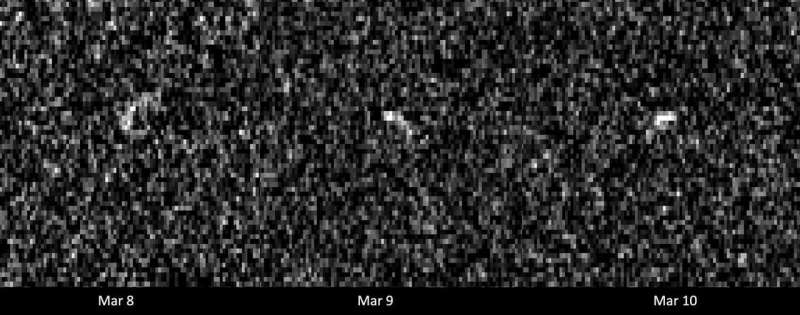When it was first discovered in 2004, Apophis was identified as one of the most dangerous asteroids in that there was a risk that it could impact Earth. But that impact assessment changed over the years after astronomers tracked Apophis, also known as asteroid 99942, and its orbit became better determined, and it became clear that it was on course to miss our planet.
A new study led by Western astronomer Paul Wiegert posits what would happen if Apophis’ orbit changed after a collision with another asteroid. Spoiler alert: it won’t.
A near-Earth object (NEO), estimated to be about 335 meters across, Apophis is infamous for its upcoming close passes to Earth, expected in 2029 and 2036. (It’s expected to pass within 37,399 kilometers on April 13, 2029 safely.)
While scientists have long since determined that the asteroid will miss the Earth safely on these occasions, Wiegert and collaborator Benjamin Hyatt from the University of Waterloo cautiously computed the paths of all 1.3 million known asteroids in the solar system to rule out the possibility that Apophis could strike another asteroid, redirecting its predicted path towards Earth.
“We calculated the paths of all known asteroids using a detailed computer simulation of our solar system and the possibility of such an unlikely event was evaluated,” said Wiegert, a physics & astronomy professor. “Fortunately, no such collisions are anticipated.”
The findings, accepted by Planetary Science Journal, are available on the arXiv preprint server now.
“Given how closely Apophis will pass Earth, there is a possible risk that a deflection from its current trajectory may move Apophis closer to impacting us,” said Hyatt, an undergraduate student at Waterloo who assisted with this research over two summers. “Hypothetically, another asteroid colliding with Apophis could cause such a deflection, motivating us to study this scenario however unlikely it may be.”
Not-so-killer asteroid
The closest passages between known asteroids and Apophis were identified by Wiegert and Hyatt for future monitoring to maintain situational awareness and to refine their orbits, but the overall risk of Apophis colliding with a known asteroid is all but zero.

“Asteroid Apophis has fascinated us as a species since its discovery in 2004: it was the first credible threat from an asteroid to our planet,” said Wiegert, a member of the Institute for Earth and Space Exploration. “Even now that we know it’s on course to miss us by a safe margin, astronomers remain vigilant. It’s the asteroid we just can’t stop watching.”
Apophis is named for the demon serpent, who personified evil and chaos in ancient Egyptian mythology.
More information:
Paul Wiegert et al, Encounter circumstances of asteroid 99942 Apophis with the catalogue of known asteroids, arXiv (2024). arxiv.org/abs/2403.00541
Provided by
University of Western Ontario
Citation:
‘Zero chance’ infamous Apophis collides with another asteroid, redirects to Earth (2024, March 4)
retrieved 4 March 2024
from
This document is subject to copyright. Apart from any fair dealing for the purpose of private study or research, no
part may be reproduced without the written permission. The content is provided for information purposes only.